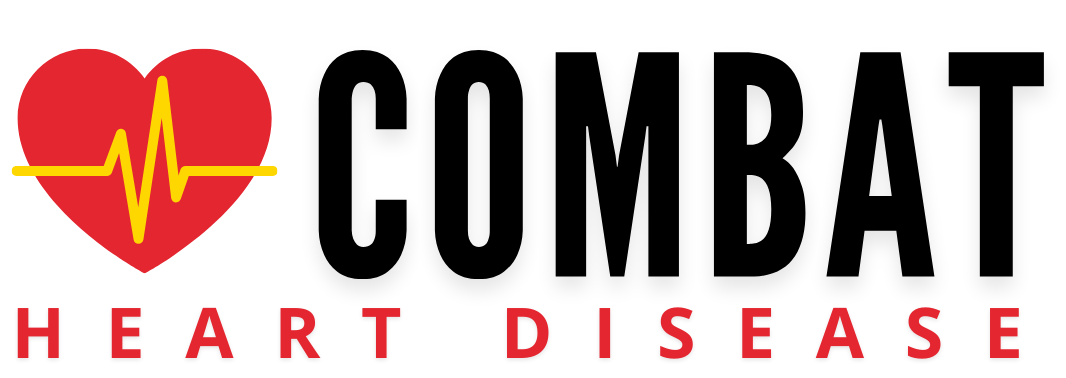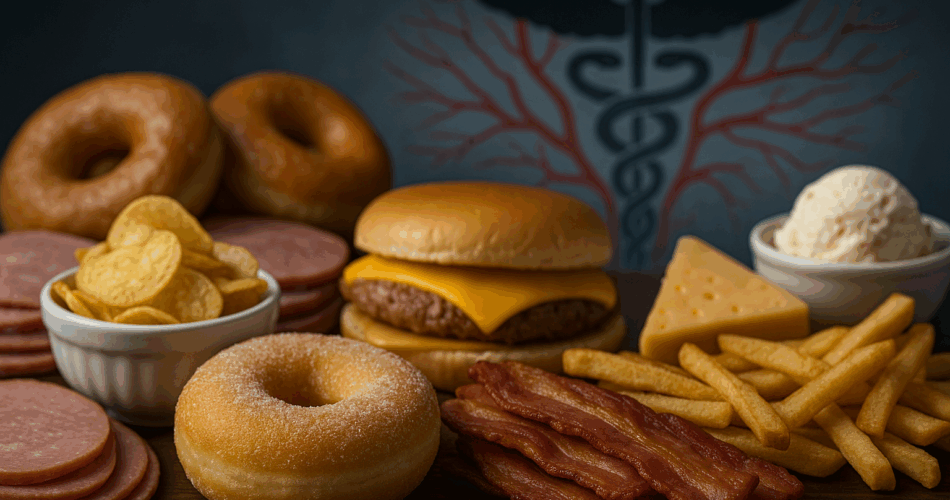Introduction: The Hidden Dangers Lurking in Your Diet
Everyday meals can look harmless — until you learn how certain foods quietly thicken your blood, slow circulation, and promote inflammation. Blood clots form when platelets stick together excessively, which can block vital arteries and lead to strokes, heart attacks, or deep vein thrombosis. Surprisingly, some of the most common comfort foods are prime culprits.
How Certain Foods Contribute to Blood Clot Formation
The Role of Inflammation and Poor Circulation
Inflammation triggers platelets to become overactive. When combined with dehydration, poor sleep, or obesity, the result is a higher risk of clotting. Processed and high-fat foods amplify this effect.
Why Cholesterol and Trans Fats Matter
Trans fats increase LDL (“bad” cholesterol) and reduce HDL (“good” cholesterol). This imbalance narrows arteries and makes blood more likely to clot — a dangerous combination for anyone with cardiovascular issues.
1. Energy Drinks
How They Affect the Blood
Energy drinks contain caffeine, sugar, and additives that raise heart rate and constrict blood vessels. These effects cause dehydration and thicker blood consistency, both linked to clot risk.
Pros and Cons
- ✅ Pros: Boost temporary alertness and focus.
- ❌ Cons: Elevate blood pressure, cause dehydration, increase platelet activity.
2. Milkshakes
Why They’re a Hidden Threat
High-fat dairy combined with sugar spikes triglycerides, impairing blood flow for hours after consumption. The thick texture and calorie density worsen vascular inflammation.
Pros and Cons
- ✅ Pros: Provides calcium and quick energy.
- ❌ Cons: Loaded with saturated fat and sugar; may reduce blood vessel flexibility.
3. Donuts
The Sugar-Fat Combo That Fuels Clots
Donuts combine refined flour, sugar, and hydrogenated oils — a trio that triggers insulin spikes, inflammation, and sticky platelets.
Pros and Cons
- ✅ Pros: Convenient and satisfying.
- ❌ Cons: Raises bad cholesterol, promotes arterial plaque buildup.
4. Processed Cheese
Sodium, Saturated Fat, and Artery Stress
Processed cheese contains preservatives and sodium phosphates that stiffen arteries. The high salt content dehydrates the body, thickening blood flow.
Pros and Cons
- ✅ Pros: Source of calcium and protein.
- ❌ Cons: Contains sodium and additives that elevate blood pressure and clot risk.
5. Margarine
The Trans Fat Trap
Once marketed as “healthier than butter,” many margarines contain partially hydrogenated oils. These fats increase inflammation and clot-promoting factors.
Pros and Cons
- ✅ Pros: Spreads easily, cheaper alternative to butter.
- ❌ Cons: May raise LDL cholesterol, damage blood vessel lining.
6. Bacon
Nitrates, Fat, and Blood Viscosity
Bacon’s nitrates, saturated fats, and high sodium content are a triple threat to your cardiovascular system. Frequent consumption thickens the blood and stiffens arteries.
Pros and Cons
- ✅ Pros: High protein, rich flavor.
- ❌ Cons: Linked to hypertension, increased clot formation, and heart disease.
7. Ice Cream
High Sugar Meets Saturated Fat
A double whammy for your blood vessels: ice cream delivers sugar-induced insulin surges plus saturated fat that raises triglycerides — both fuel for clot risk.
Pros and Cons
- ✅ Pros: Provides calcium and comfort food satisfaction.
- ❌ Cons: Excess sugar and fat inflame blood vessels and impair circulation.
8. Potato Chips
The Crunch That Damages Arteries
Chips are often fried in trans-fat oils and packed with sodium. This combination dehydrates the body and elevates platelet stickiness.
Pros and Cons
- ✅ Pros: Quick snack, provides potassium (in small amounts).
- ❌ Cons: High sodium, trans fats, and acrylamide from frying increase clot risk.
9. French Fries
The Deep-Fried Danger
French fries absorb oxidized oils that damage artery walls. The result is inflammation, reduced elasticity, and clot formation in small capillaries.
Pros and Cons
- ✅ Pros: Provides energy and fiber from potatoes (if baked).
- ❌ Cons: Deep-fried oils trigger oxidation, inflammation, and sluggish blood flow.
10. White Bread
Refined Carbs and Insulin Spikes
Refined flour digests quickly, causing sugar spikes and insulin surges that thicken blood and damage artery linings. Over time, this can worsen clot risks.
Pros and Cons
- ✅ Pros: Inexpensive, easy to digest.
- ❌ Cons: Lacks fiber and nutrients; raises insulin and inflammation levels.
Practical Tips to Prevent Blood Clots Naturally
Foods That Support Circulation
- Eat more leafy greens, berries, and omega-3-rich fish to improve blood flow.
- Include garlic, turmeric, and ginger to reduce platelet aggregation.
- Stay hydrated and maintain healthy body weight.
Lifestyle Adjustments for Heart Health
- Exercise regularly — even 30 minutes of brisk walking reduces clot risk.
- Avoid sitting for long hours; move every 60 minutes.
- Quit smoking and limit alcohol.
Final Thoughts: Protecting Your Heart Through Smarter Choices
Blood clots may sound sudden, but they’re often years in the making — the result of daily dietary choices. By avoiding these 10 clot-triggering foods and replacing them with whole, unprocessed alternatives, anyone can lower their risk and strengthen their heart. The goal isn’t to live in fear but to live in balance — making small changes today that protect your health tomorrow.
FAQs
1. Can I eat these foods occasionally without risk?
Yes, moderation matters. Occasional consumption is less concerning if paired with a balanced, anti-inflammatory diet.
2. What foods help dissolve blood clots naturally?
Garlic, turmeric, green tea, and omega-3-rich fish support better blood flow and reduce clot formation.
3. Are plant-based meats safer for blood health?
Some are, but many contain high sodium or additives — always read labels before assuming they’re healthier.
4. How much water should I drink daily to reduce clot risk?
Aim for 2–3 liters per day to maintain healthy blood viscosity.
5. Does exercise help prevent blood clots?
Absolutely. Physical movement enhances circulation and lowers the chance of blood pooling in the veins.




